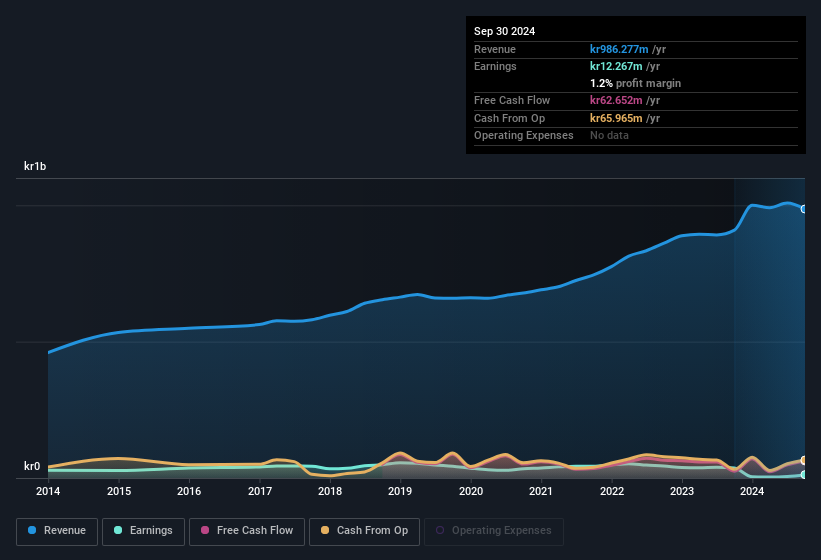Shareholders appeared unconcerned with Webstep ASA's (OB:WSTEP) lackluster earnings report last week. We did some digging, and we believe the earnings are stronger than they seem.
See our latest analysis for Webstep

Zooming In On Webstep's Earnings
Many investors haven't heard of the accrual ratio from cashflow, but it is actually a useful measure of how well a company's profit is backed up by free cash flow (FCF) during a given period. To get the accrual ratio we first subtract FCF from profit for a period, and then divide that number by the average operating assets for the period. You could think of the accrual ratio from cashflow as the 'non-FCF profit ratio'.
That means a negative accrual ratio is a good thing, because it shows that the company is bringing in more free cash flow than its profit would suggest. While having an accrual ratio above zero is of little concern, we do think it's worth noting when a company has a relatively high accrual ratio. That's because some academic studies have suggested that high accruals ratios tend to lead to lower profit or less profit growth.
Over the twelve months to September 2024, Webstep recorded an accrual ratio of -0.15. That implies it has very good cash conversion, and that its earnings in the last year actually significantly understate its free cash flow. Indeed, in the last twelve months it reported free cash flow of kr63m, well over the kr12.3m it reported in profit. Webstep shareholders are no doubt pleased that free cash flow improved over the last twelve months.
That might leave you wondering what analysts are forecasting in terms of future profitability. Luckily, you can click here to see an interactive graph depicting future profitability, based on their estimates.
Our Take On Webstep's Profit Performance
As we discussed above, Webstep has perfectly satisfactory free cash flow relative to profit. Based on this observation, we consider it likely that Webstep's statutory profit actually understates its earnings potential! Unfortunately, though, its earnings per share actually fell back over the last year. The goal of this article has been to assess how well we can rely on the statutory earnings to reflect the company's potential, but there is plenty more to consider. If you'd like to know more about Webstep as a business, it's important to be aware of any risks it's facing. At Simply Wall St, we found 3 warning signs for Webstep and we think they deserve your attention.
Today we've zoomed in on a single data point to better understand the nature of Webstep's profit. But there is always more to discover if you are capable of focussing your mind on minutiae. For example, many people consider a high return on equity as an indication of favorable business economics, while others like to 'follow the money' and search out stocks that insiders are buying. So you may wish to see this free collection of companies boasting high return on equity, or this list of stocks with high insider ownership.
Valuation is complex, but we're here to simplify it.
Discover if Webstep might be undervalued or overvalued with our detailed analysis, featuring fair value estimates, potential risks, dividends, insider trades, and its financial condition.
Access Free AnalysisHave feedback on this article? Concerned about the content? Get in touch with us directly. Alternatively, email editorial-team (at) simplywallst.com.
This article by Simply Wall St is general in nature. We provide commentary based on historical data and analyst forecasts only using an unbiased methodology and our articles are not intended to be financial advice. It does not constitute a recommendation to buy or sell any stock, and does not take account of your objectives, or your financial situation. We aim to bring you long-term focused analysis driven by fundamental data. Note that our analysis may not factor in the latest price-sensitive company announcements or qualitative material. Simply Wall St has no position in any stocks mentioned.
About OB:WSTEP
Webstep
Provides information technology (IT) consultancy services to public and private businesses in Norway and Sweden.
Undervalued with excellent balance sheet.
Similar Companies
Market Insights
Weekly Picks


Is Ubisoft the Market’s Biggest Pricing Error? Why Forensic Value Points to €33 Per Share


EU#4 - Turning Heritage into the World’s Strongest Luxury Empire


The "Easy Money" Is Gone: Why Alphabet Is Now a "Show Me" Story
Recently Updated Narratives


Novo Nordisk - A Fundamental and Historical Valuation


Is Ubisoft the Market’s Biggest Pricing Error? Why Forensic Value Points to €33 Per Share


The "David vs. Goliath" AI Trade – Why Second Place is Worth Billions
Popular Narratives


The "Sleeping Giant" Stumbles, Then Wakes Up

Undervalued Key Player in Magnets/Rare Earth


NVDA: Expanding AI Demand Will Drive Major Data Center Investments Through 2026
Trending Discussion




